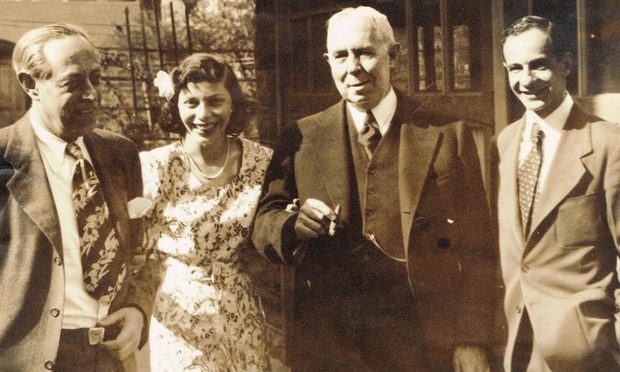First Female Federal Appeals Law Clerk, Later Snubbed at SCOTUS, Dies at 94
"In 1945, the prospects for a female law graduate were pretty dismal," Ebb wrote last year at the ABA Journal. The Columbia Law School graduate leaves a legacy as a pioneering lawyer.
February 22, 2019 at 12:23 PM
3 minute read
The original version of this story was published on New York Law Journal
 From left to right: Judge Jerome Frank, Carmel Ebb, Judge Augustus Hand and Lawrence Ebb at the Ebbs' wedding reception. Courtesy photo.
From left to right: Judge Jerome Frank, Carmel Ebb, Judge Augustus Hand and Lawrence Ebb at the Ebbs' wedding reception. Courtesy photo.
Carmel Ebb, believed to be the first female to clerk for a federal appeals court judge, died in Maryland on Feb. 10 at age 94, leaving a legacy as a pioneering lawyer who overcame barriers that made a career in the law difficult for women.
According to her obituary, Ebb—then Carmel Prashker—finished first in her class at Columbia Law School in 1945. Nonetheless, she wrote in an ABA Journal article last year, “female graduates couldn't expect to be recommended as law clerks to sitting judges, no matter how well their records stacked up against their male classmates.”
One of her sons, Peter Ebb, a partner at Ropes & Gray in Boston, said this week that Carmel Ebb entered the legal profession in “an environment in which women (including my mother) were, literally, chased around desks by male professionals with relative impunity.”
But an article in the Saturday Evening Post by the acclaimed Judge Jerome Frank of the U.S. Court of Appeals for the Second Circuit in New York inspired her. He wrote that women were as intellectually competent as men, and that there was no reason not to hire a woman for a job that was viewed as man's work.
That emboldened her to apply for a clerkship with Frank, and he hired her. There she met her future husband, Lawrence Ebb, who was clerking for another Second Circuit judge, Augustus Hand. Coincidentally, not long before she went to work for Frank, Supreme Court Justice William O. Douglas hired Lucile Lomen to be the first woman to clerk at the high court.
After her clerkship on the Second Circuit, Carmel Ebb's husband went on to clerk for Chief Justice Fred Vinson in Washington. She followed suit, and interviewed with an unnamed Supreme Court justice for a clerkship.
It went well, but as her obituary put it, “Her hopes were dashed when the justice concluded their conversation by saying he had no doubt she would be a fine clerk, but that his wife would never allow him to work in such close proximity to a woman.”
Her son, Peter Ebb, declined to name the justice, explaining that his mother “wasn't interested in maligning people.”
Undeterred, Carmel Ebb landed jobs at the Atomic Energy Commission and other federal agencies where women were more welcomed. She went on to work in private practice at firms in New York, becoming a partner in one firm—a rare achievement for a woman. She stayed active in the law through her 80s.
Peter Ebb said his mother's long career as a lawyer was largely unheralded. “She thought it was foolishness” to be described as a trailblazer, Ebb said. She would downplay all that, he said, instead just saying, “I got very lucky.”
This content has been archived. It is available through our partners, LexisNexis® and Bloomberg Law.
To view this content, please continue to their sites.
Not a Lexis Subscriber?
Subscribe Now
Not a Bloomberg Law Subscriber?
Subscribe Now
NOT FOR REPRINT
© 2025 ALM Global, LLC, All Rights Reserved. Request academic re-use from www.copyright.com. All other uses, submit a request to [email protected]. For more information visit Asset & Logo Licensing.
You Might Like
View All
Deluge of Trump-Leery Government Lawyers Join Job Market, Setting Up Free-for-All for Law Firm, In-House Openings
4 minute read
'As I've Grown Older': John Morgan Looks Back at a Life in Law

The 'Biden Effect' on Senior Attorneys: Should I Stay or Should I Go?
9 minute read
2024 GC Pay Report: Signing Bonuses Swell in Size as Companies Shy Away From Internal Hires
7 minute readTrending Stories
- 1Court Rejects San Francisco's Challenge to Robotaxi Licenses
- 2'Be Prepared and Practice': Paul Hastings' Michelle Reed Breaks Down Firm's First SEC Cybersecurity Incident Disclosure Report
- 3Lina Khan Gives Up the Gavel After Contentious 4 Years as FTC Chair
- 4Allstate Is Using Cell Phone Data to Raise Prices, Attorney General Claims
- 5Epiq Announces AI Discovery Assistant, Initially Developed by Laer AI, With Help From Sullivan & Cromwell
Who Got The Work
J. Brugh Lower of Gibbons has entered an appearance for industrial equipment supplier Devco Corporation in a pending trademark infringement lawsuit. The suit, accusing the defendant of selling knock-off Graco products, was filed Dec. 18 in New Jersey District Court by Rivkin Radler on behalf of Graco Inc. and Graco Minnesota. The case, assigned to U.S. District Judge Zahid N. Quraishi, is 3:24-cv-11294, Graco Inc. et al v. Devco Corporation.
Who Got The Work
Rebecca Maller-Stein and Kent A. Yalowitz of Arnold & Porter Kaye Scholer have entered their appearances for Hanaco Venture Capital and its executives, Lior Prosor and David Frankel, in a pending securities lawsuit. The action, filed on Dec. 24 in New York Southern District Court by Zell, Aron & Co. on behalf of Goldeneye Advisors, accuses the defendants of negligently and fraudulently managing the plaintiff's $1 million investment. The case, assigned to U.S. District Judge Vernon S. Broderick, is 1:24-cv-09918, Goldeneye Advisors, LLC v. Hanaco Venture Capital, Ltd. et al.
Who Got The Work
Attorneys from A&O Shearman has stepped in as defense counsel for Toronto-Dominion Bank and other defendants in a pending securities class action. The suit, filed Dec. 11 in New York Southern District Court by Bleichmar Fonti & Auld, accuses the defendants of concealing the bank's 'pervasive' deficiencies in regards to its compliance with the Bank Secrecy Act and the quality of its anti-money laundering controls. The case, assigned to U.S. District Judge Arun Subramanian, is 1:24-cv-09445, Gonzalez v. The Toronto-Dominion Bank et al.
Who Got The Work
Crown Castle International, a Pennsylvania company providing shared communications infrastructure, has turned to Luke D. Wolf of Gordon Rees Scully Mansukhani to fend off a pending breach-of-contract lawsuit. The court action, filed Nov. 25 in Michigan Eastern District Court by Hooper Hathaway PC on behalf of The Town Residences LLC, accuses Crown Castle of failing to transfer approximately $30,000 in utility payments from T-Mobile in breach of a roof-top lease and assignment agreement. The case, assigned to U.S. District Judge Susan K. Declercq, is 2:24-cv-13131, The Town Residences LLC v. T-Mobile US, Inc. et al.
Who Got The Work
Wilfred P. Coronato and Daniel M. Schwartz of McCarter & English have stepped in as defense counsel to Electrolux Home Products Inc. in a pending product liability lawsuit. The court action, filed Nov. 26 in New York Eastern District Court by Poulos Lopiccolo PC and Nagel Rice LLP on behalf of David Stern, alleges that the defendant's refrigerators’ drawers and shelving repeatedly break and fall apart within months after purchase. The case, assigned to U.S. District Judge Joan M. Azrack, is 2:24-cv-08204, Stern v. Electrolux Home Products, Inc.
Featured Firms
Law Offices of Gary Martin Hays & Associates, P.C.
(470) 294-1674
Law Offices of Mark E. Salomone
(857) 444-6468
Smith & Hassler
(713) 739-1250










